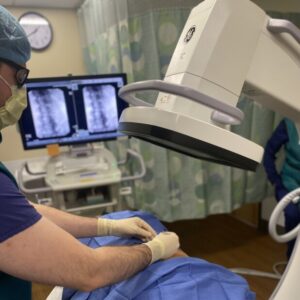Clinical Experience

UNC Health is a not-for-profit integrated health care system, owned by the State of North Carolina and based in Chapel Hill. It exists to further the teaching mission of the University of North Carolina and to provide state-of-the-art patient care. A distinguishing characteristic of UNC Health Care is its association with the UNC-Chapel Hill School of Medicine, a nationally eminent research institution. From well-baby check-ups and chronic disease care, to life-saving surgeries and cutting-edge gene therapy, UNC Health Care is improving health and treating disease across North Carolina. In addition to comprehensive medical, surgical and psychiatric care, UNC is a leader in health promotion and disease prevention.
UNC Hospitals is the cornerstone of UNC Health Care. It is a public, academic medical center operated by and for the people of North Carolina. People from all 100 North Carolina counties and throughout the Southeast are patients at the 804-bed facility which serves more than 36,000 patients each year. UNC delivers the best in interdisciplinary health care. UNC Hospitals includes the North Carolina Children’s Hospital, North Carolina Memorial Hospital, North Carolina Neurosciences Hospital, North Carolina Women’s Hospital, and the North Carolina Cancer Hospital (Lineberger Comprehensive Cancer Center).
The faculty of the Pain Medicine Training Program include:
Brooke Chidgey, MD, Associate Professor of Anesthesiology / Division Chief
Amy M. Goetzinger, PhD, Associate Professor/Clinical Psychologist
Dominika James, MD, Associate Professor of Anesthesiology / Fellowship Program Director
Maryam Jowza, MD, Associate Professor of Anesthesiology
Andrew Lobonc, MD, Associate Professor of Anesthesiology
Matthew Mauck, MD, PhD, Assistant Professor of Anesthesiology / Vice Chair of Research
Seema Patidar, PhD, Associate Professor / Clinical Psychologist / UNC Anesthesiology Wellness Committee Chair
Irina Phillips, MD, Assistant Professor of Anesthesiology
Brad Brown, MD, Assistant Professor of Anesthesiology
Skye Margolies, PhD, Associate Professor / Clinical Psychologist
In addition, there ancillary faculty from related specialties participate in the training of our fellows during clinical rotations within their specialties.
Our clinical services provide the core of the training program in pain medicine. They include:
- The Hospital Pain Service: This service provides daily management of patients with postoperative, post-traumatic, and other types of acute pain requiring specialized interventions such as epidural analgesia, other regional anesthetic techniques, or complex pharmacological management. Support is also provided to the operating rooms for placement of epidural catheters. A dedicated anesthesiology attending is assigned daily, along with one fellow. Consultations are also provided for complex inpatient pain management problems, and daily rounds are performed.
- UNC Pain Management Center: The Center is our community-based outpatient clinic for the management of chronic and cancer pain. We provide a comprehensive interdisciplinary, yet individualized, approach to patient care, drawing upon the expertise of our faculty as well as consultants from other specialties. A three pronged approach to patient evaluation and management emphasizes pain control, psychological optimization, and rehabilitation.
- The University of North Carolina Spine Center: The Spine Center is an interdisciplinary clinic practice involving physician specialists from our program and from the departments of neurosurgery, orthopedic surgery, rheumatology and physical medicine, and rehabilitation. Additionally, the center employees specialty nurses and physical therapists. The facility includes specialized procedure rooms with state of the art monitoring, interview rooms, C-arm fluoroscopy, and ultrasound machines. It serves as our base for interventional pain techniques, including trigger point injections, cervical and lumbar epidural blocks/steroids, sympathetic blocks, plexus blocks, peripheral blocks, joint injections, radiofrequency denervation, nerve root blocks, and spinal cord stimulator trials. We also offer OR-based, state-of-the-art interventional techniques, including implantation of spinal cord stimulators and intrathecal infusion pumps.
For most of the year, our trainees are assigned to one of these three clinical sites on a rotating cycle. In addition, fellows rotate during the year in the following specialty areas: anesthesiology (for non-anesthesiologists), neurology, sports medicine, physical medicine and rehabilitation, psychiatry, palliative care, radiology, and pediatric pain management.